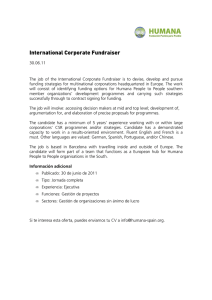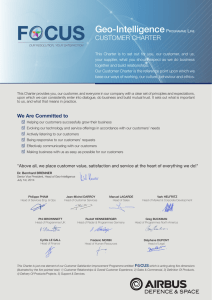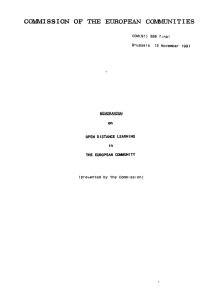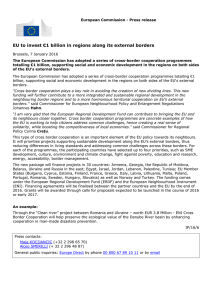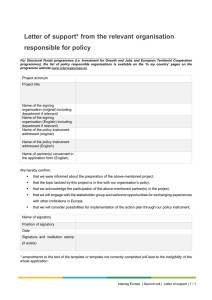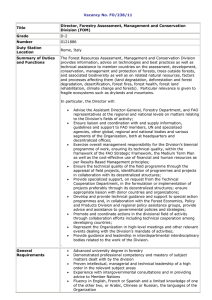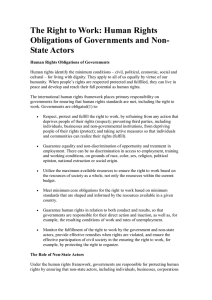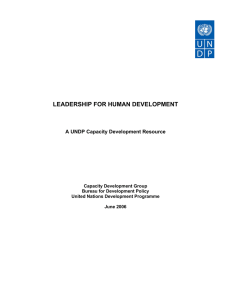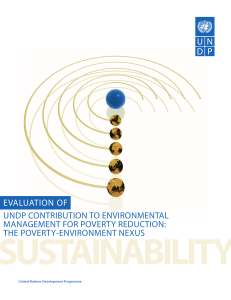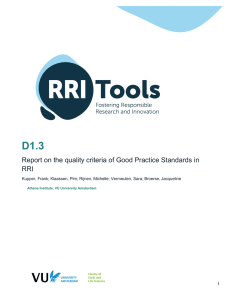the initiative
Anuncio
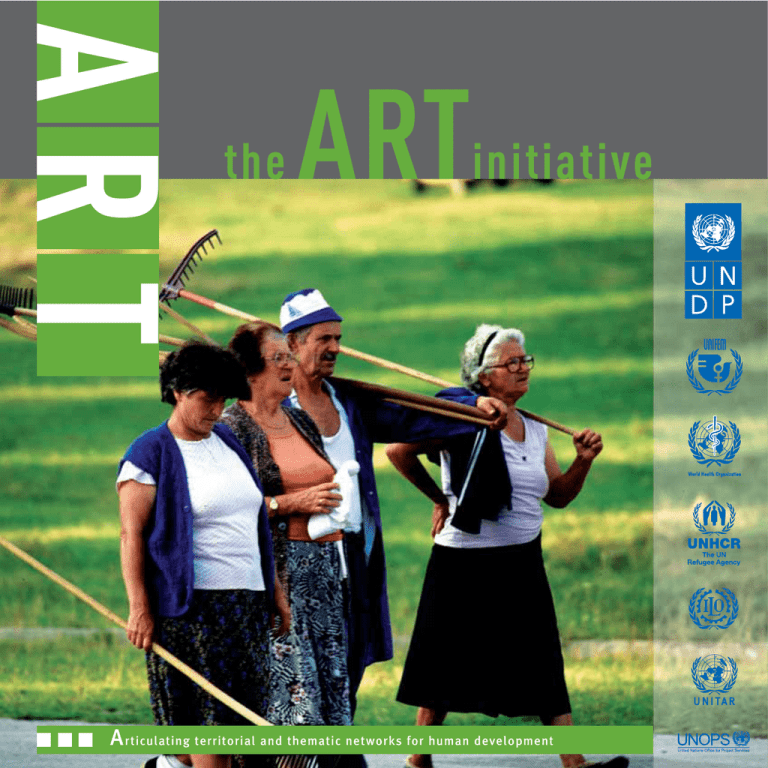
ART the ART initiative A rticulating territorial and thematic networks for human development AR T WHERE WE ARE AND WHO PARTICIPATES At present, ART GOLD Programmes are underway in Albania, Colombia, Cuba, Dominican Republic, Ecuador, Lebanon, Morocco, Serbia, Sri Lanka and Uruguay. Other initiatives are being planned in Bolivia, Indonesia, Kosovo, Macedonia and Mozambique. Thematic ART networks also carry out activities in Brazil, El Salvador, Guatemala, Honduras and Nicaragua. The Art Initiative is supported by the governments of Belgium, France, Italy and Spain. The governments of other donor countries such as Canada, Japan, Monaco, Portugal, Sweden, Switzerland and the United Kingdom, as well as the European Commission, contribute to various ART country programmes. More than 400 regional and local governments, and their associations, such as CPMR, NRG4SD, REVES, ANCI, the Spanish Confederation of local and regional Cooperation Funds, and Northern Forum, collaborate with the ART Initiative at the international level and in countries. In March 2007, more than 1000 representatives of 65 national governments and of 150 regional and local governments took part in the First International Convention on a Territorial Approach to Development, organized in Marseille by the UNDP and the Conference of Peripheral Maritime Regions of Europe and the Provence-Alpes-Côte d’Azur Region (PACA). The participants see the ART Initiative as a fundamental tool for the implementation and coordination of decentralized cooperation activities that wish to have a concrete impact on the achievement of the Millennium Development Goals in countries. The ART Initiative contributes to the United Nations reform through the active participation of the UNDP, ILO, UNIFEM, UNITAR, UNHCR, UNOPS and WHO. The ART Initiative helps to reduce aid fragmentation, complying with the Paris Declaration and the European Consensus on Aid Effectiveness. ART is an international cooperation initiative that brings together programmes and activities of several United Nations Agencies: UNDP, ILO, UNIFEM, UNESCO, UNITAR, UNHCR, UNOPS, WHO and others. It promotes a new type of multilateralism in which the United Nations system works with governments to promote the active participation of local communities and social actors from all countries. ART shares the Millennium Development Goals. AR T MILLENNIUM DEVELOPMENT GOALS TO BE ACHIEVED BY 2015 1. 2. 3. 4. 5. 6. 7. 8. Eradicate extreme poverty and hunger Achieve universal primary education Promote gender equality and empower women Reduce child mortality Improve maternal health Combat HIV/AIDS, malaria and other diseases Ensure environmental sustainability Promote a global partnership for development A rticulating territorial and thematic networks for human development 1 WHY ART? ART is based on three premises: • Each of the eight Millennium Development Goals is closely linked with the others and can be achieved only by working across sectors, with institutions and interested social groups and partners working together, avoiding projects with rigid sector divisions or limited to only one category of persons. • To effectively combat poverty, illiteracy, discrimination, disease, environmental deterioration, social breakdown and violence, it is not enough to address their tangible effects. Rather, it is their root causes that must be confronted: that is the mechanisms of social exclusion that characterize unequal and imbalanced development. • A joint effort by all local, regional, national and international actors is essential for overcoming the structural obstacles to development. AR T 2 ART was founded in November 2004, but grew out of programmes operating within the multilateral human development framework, carried out since 1989 under various names: Prodere, Smalp, Hedip, PDHL, PDHI, Sehd, Atlas, Print, Pasarp, City to City, Appi, and Universitas. These programmes involved the following countries: Albania, Angola, Belize, Bosnia and Herzegovina, Colombia, Costa Rica, Cuba, Dominican Republic, El Salvador, Guatemala, Honduras, Mozambique, Nicaragua, Serbia, South Africa, Tunisia. The cooperating governments were those of Belgium, Canada, Italy, United Kingdom, Spain, Sweden, Switzerland and the European Union. The United Nations agencies involved were: UNDP, HABITAT, IFAD, ILO, PAHO, UNEP, UNESCO, UNHCR, UNICEF, UNICRI, UNIFEM, UNOPS, WFP and WHO. THE ART APPROACH ART valorises the active role of local communities in development processes. Local communities are populations living in the areas corresponding to a country’s political-administrative subdivisions, be they regions, provinces or municipalities. With their own natural, historic, cultural and knowledgebased resources, and with their own institutions and governmental systems, local communities play a crucial role in governance and development, taking on commitments and responsibilities and engaging in active dialogue with central government structures and with international organizations. Multilateralism is the future 28. To achieve our goals of sustainable development, we need more effective, democratic and accountable international and multilateral institutions. 29. We reaffirm our commitment to the principles and purposes of the Charter of the United Nations and international law, as well as to the strengthening of multilateralism. We support the leadership role of the United Nations as the most universal and representative organization in the world, which is best placed to promote sustainable development. 30. We further commit ourselves to monitoring progress at regular intervals towards the achievement of our sustainable development goals and objectives. Johannesburg Declaration on Sustainable Development. 2002 AR T ART supports national government policies that move in the direction of a democratic decentralization, provided with the corresponding resources, and that support the development of the country’s local communities. These choices are encouraged and supported because they are generally an indication of a political will to move toward more sustainable, participatory, fair and peaceful development. ART also operates at the international level to provide programmes within countries with the institutional and technical support of the United Nations system and its specialized centres and, above all, to promote functioning decentralized cooperation partnerships between local communities and social actors from the public, private and associative sectors of the South and North. New multilateralism is characterized by a worldwide network of constructive, peaceful and high-quality exchanges. ART promotes and supports the network with a global system of cooperation that links together local, regional, national and international actors so that they can work together more effectively toward achieving the Millennium Development Goals. 3 COUNTRY FRAMEWORK PROGRAMMES ART promotes and supports national cooperation framework programmes for governance and local development, termed ART GOLD. The framework programmes create an organized institutional context that allows the various national and international actors to contribute to the country’s human development in a coordinated and complementary way. Participants include donor countries, United Nations agencies, regional and municipal governments, decentralized cooperation actors, associations, universities, private sector and non-governmental organizations. The framework programme is a tool that these actors can employ to expand the sustainability and impact of their initiatives without having to forfeit their own identity or visibility. National and local coordination structures At a central level, the framework programmes are managed by a National Coordinating Committee (NCC), formed by the government and the United Nations Country Office, with the participation of the donors involved. The NCC orients various projects and contributions towards a programme logic, thereby generating marked improvements in the outcome and impact of international cooperation. The framework programmes provide the opportunity to translate the donors’ willingness to coordinate – expressed insistently at various institutional levels – into an effective operating strategy. The NCC identifies which regions in the country are to be involved in the framework programme. It does so on the basis of national priorities and interest expressed by the donors involved. Within the regions (or departments or provinces) and their municipalities, local working groups are formed. Public, associative and private actors from the area participate in the AR T 4 working groups along with local representatives of the central ministries and state structures. The local working groups are responsible for drawing up action plans to be funded with contributions from international cooperation partners. These plans are brought together in periodic national operating plans of the framework programme. The NCC and the local working groups programme the use of resources made available through international cooperation, ensuring that they complement resources already included in the public budget. In this way, the projects acquire greater sustainability and the methodologies adopted for bringing diverse actors together can progressively influence current modes of programming public expenditure and also help to orient private investment. The NCC ensures that local initiatives are in line with national development policies. It is also responsible for disseminating the most effective work methods to other parts of the country and for promoting the involvement of new donors. The local working groups coordinate the implementation of initiatives in order to avoid overlaps and gaps, and they maintain contact with donors present in their area. UN Country Offices, through ART GOLD Chief Technical Advisors and teams, support the NCC and local working groups in all their activities. Fields of action ART works in the following complementary fields of action using an intersectoral approach: • GOVERNANCE: improvements in public administrations; support to local institutions for programming territorial development; training of local administrators and technical staff; advocacy for rights and for active citizenship; dialogue to improve the rapport between institutions and social actors; promotion of a gender approach and of innovation in all fields of action. • ENVIRONMENTAL PROTECTION AND TERRITORIAL PLANNING: AR T plans and projects for the valorisation of the territory’s historical and cultural heritage, for the sustainable and rational use of natural resources, to improve the urban habitat, to produce and distribute clean energy, to improve communications and transport and to reduce vulnerability to natural disasters. • LOCAL ECONOMIC DEVELOPMENT: devising plans and projects for valorising the potential of the local territory, creating employment opportunities for all social groups and improving the territory’s competitiveness; promoting collaboration between public and private actors through economic development agencies which provide integrated services to local enterprises and cooperatives, strengthen the territory’s chain of competitive value and promote international partnerships and investment. • LOCAL HEALTH AND WELFARE SYSTEMS: devising integrated plans and projects for improving the population’s health and social well-being, and the organization of basic services and programmes so that they are accessible to rural populations, people lacking social security coverage and those who are most vulnerable. • LOCAL BASIC EDUCATION AND TRAINING SYSTEMS: devising integrated plans and projects for facilitating school access for all children; creating links between schools and the territory; adapting education programmes to specific cultural settings; improving professional training; disseminating the culture of human development. 5 Local-level work methods The regional and municipal working groups play a fundamental role in promoting participation in programming and managing development activities. The method of work envisages the following stages: • At the regional level, the working groups launch a process to increase knowledge of the territory, its resources and potential, and of the problems that need resolving; they organize thematic subgroups for the various fields of action, and conduct research and studies deemed necessary; they organize seminars and training courses to improve the skills of public, associative and private actors related to participatory planning and management of development. • At the municipal and grassroots level, the working groups carry out a similar process for acquiring knowledge of the territory and defining priorities, using methods that facilitate the participation of people from rural areas and of vulnerable groups. As a result, municipal plans for using international resources are drawn up, which include improvements in local services in order to make them accessible to the entire population and development projects that enable the valorisation of local resources. • A synthesis of the municipal programming process is carried out at the regional level, where a document is drawn up to plan the use of available and potential international cooperation resources (regional and local plan for international cooperation). In this way, international cooperation contributes to the processes of strategic and participatory planning. AR T 6 • During the programming process, there is also a document produced for widespread distribution that describes the territory, highlighting its development potential (natural and human resources, historical and cultural heritage, etc.) and also its main problems (e.g. unemployment, migration, disadvantaged areas, vulnerability within the territory and its social structures, etc.). The document is called a territorial marketing document and is used to attract international partners and direct them to those initiatives for which the local community wishes to establish development partnerships and work together towards the MDGs. • The projects identified through this process are implemented, in a way which valorises and reinforces local management capacities. The local working groups coordinate and guide visits of representatives of cooperation organizations interested in establishing development partnerships: bilateral donors, decentralized cooperation partners, universities, businesses, NGOs and others. In the course of the visits, the parties agree on specific projects to be carried out in the context of the regional and local plan for international cooperation. Decentralized cooperation Community maps of risks and resources AR T One of the methods used in all the framework programmes in order to encourage public participation in development planning and management is that of the community maps of risks and resources. The drawing up of the maps can involve health and social workers, local administration officials, and scientific and civil society organizations. In many cases, the maps are made in the schools, with the help of teachers, because children are natural community promoters. In school, the children draw a topographic map of the territory, discuss the risks they know about and choose a different symbol for each risk. Then they go out into the community to identify where the risks are and to discuss them with their families, with shopkeepers, public service workers, the authorities and all the actors interested in participating. During the visits, with everyone’s collaboration, the symbols representing the risks are placed on the map, and there is discussion about how to prevent them or limit their consequences. There is also discussion on the material and human resources necessary to prevent and reduce the risks. In the concluding discussions with the community, agreement is reached regarding priorities, the most appropriate strategies and the initiatives to be undertaken. Projects are identified that can be carried out immediately by various actors in the community using the available local resources. More complex initiatives, which require additional funds and specific commitments from the authorities, are also identified. The framework programmes earmark specific operating funds for implementing projects with immediate impact (as identified through the participatory mapmaking exercise), and they also provide support to the communities for implementing the more complex initiatives. In agreement with governments, ART supports local communities in building development partnerships as part of the framework programmes. More then 400 decentralized cooperation partnerships are operational in various countries. Decentralized cooperation projects may involve all or only some of the fields of action included in the framework programmes. What matters is that they be defined in collaboration with the local work groups and that they fit with the regional and local plans for international cooperation. The local communities of donor countries, through their public and private actors, make an important contribution to local development processes, not only because they provide new sources of financing, but also – and above all – because they make available their knowledge and experience. Decentralized cooperation projects serve as laboratories for innovation in the various fields of human development, driven by a spirit of shared dignity and mutual learning. They also serve to promote social-solidarity, scientific, cultural, professional, training, economic and commercial initiatives and exchanges that nurture an open and internationalized vision of development. Through its international services and framework programmes, the ART Initiative provides technical and organizational support to local communities and their national and international associations to establish, and to render operational, decentralized cooperation partnerships oriented toward the Millennium Development Goals. Upon request, ART also administers funds raised by local communities. 7 ART INTERNATIONAL ART International, which forms part of the Hub for Innovative Partnerships of UNDP Geneva, offers a range of international-level services to country framework programmes, using, amongst others, networks of centres of excellence and universities of the United Nations and various countries. Through its specialized services, ART International undertakes the following activities: • It provides technical and organizational support to UN Country Offices interested in helping governments establish ART framework programmes; promotes South-South exchanges between countries involved in the programmes; organizes international events and ensures the circulation of information and documentation; provides technical assistance for the various areas of action, through its own personnel, from an international roster of senior experts and by mobilizing centres of excellence. AR T 8 • It offers technical, organizational and administrative support to local communities that intend to set up decentralized cooperation partnerships; it distributes territorial marketing documents to local communities of donor countries and it organizes reciprocal field visits. • It provides specialized technical assistance for setting up local economic development agencies and for linking them in a network; it promotes partnerships between local economies that translate into mutually beneficial productive projects, mixed enterprises, commercial and technological exchanges, and training activities for operators and entrepreneurs. • It identifies relevant innovations for human development and disseminates them in countries where the programmes are operating in collaboration with national scientific institutions; it mobilizes the technical assistance of innovators to help transfer their ideas to interested countries via mechanisms for South-South and North-South cooperation. • It provides specialized technical assistance in the area of basic health and welfare policies and practices, with a special focus on territorial services and persons in difficulty; it supports governments interested in promoting policies to overcome segregating institutions. • It promotes links between universities in the North and South and supports their involvement in innovative practices of international cooperation for human development; it designs and offers university-level and refresher courses for people involved in the programmes; it undertakes research to systematise and disseminate knowledge about high-quality experiences. ART AND DONORS The UNDP Geneva Hub for Innovative Partnerships, which has set up a specific Trust Fund, promotes a new active multilateralism, which involves the full participation of donors in identifying, formulating, carrying out and assessing initiatives. The Hub is at the service of national governments that decide, in close collaboration with regional and local governments, to support a strategic role for the United Nations, able to offer countries with different histories and cultures the chance to work together, bringing in the contribution of local communities and social actors for a more human, peaceful, equitable and sustainable global development. I ask every developing country to adopt and begin to implement a comprehensive national strategy bold enough to achieve the Millennium Development Goals by 2015; and to mobilise all its resources behind that strategy. And I ask every developed country to support these strategies, by increasing the amount it spends on development and debt relief, and doing whatever it can to level the playing-field for world trade. Statement by the United Nations Secretary-General. 2005 AR T Concrete ways in which active donor multilateralism is practised include: consultative committees; the organization of joint technical missions in countries; consultation for selecting international personnel; adoption of shared monitoring and evaluation mechanisms; the organization of national and international informative events; and other activities defined by mutual agreement. The Hub can establish specific agreements with different UN Agencies and Programmes, as well as the national governments of donor countries for single projects, or multi-year framework agreements to support one or more country programmes. These agreements can include the systematic involvement of local administrations in decentralized cooperation, as well as the ongoing involvement of centres of excellence, universities and other actors in the country. The Hub also sets up collaboration agreements with regional and local governments for carrying out decentralized cooperation activities in the context of framework programmes or for organizing international initiatives through centres of excellence located within their territory. Such agreements establish an active role for local governments in the context of the ART Initiative. 9 the ART initiative CONTACTS To establish relationships with ART International, please contact: ART Scientific Committee for human development cooperation Hub for Innovative Partnerships, UNDP Office, Geneva The ART Scientific Committee for human development cooperation, promotes country framework programmes and disseminates the culture of human development and innovation at the international level. It is in contact with the UN and national research and training institutes and also draws on an international network of experts from the worlds of science, culture and international cooperation. The UNDP has established the Hub for Innovative Partnerships at its Geneva headquarters to promote innovative partnerships for supporting governance and local development processes already underway in several countries. The Hub is responsible, on behalf of the UNDP, for the international coordination of the ART Initiative programmes and activities. It forms part of the Bureau for Resources and Strategic Partnerships (BRSP) in New York and provides support to the UNDP country offices. The World Alliance of Cities Against Poverty (WACAP) also operates within the Hub framework. • Gustavo López Ospina, Coordinator of the Scientific Committee: cs.art@unops.org • Luciano Carrino, Executive Representative of the Scientific Committee: art.sc@undp.org • Christophe Nuttall, Director of the Hub: christophe.nuttall@undp.org • Mohand Cherifi, Coordinator of WACAP: mohand.cherifi@undp.org • Giovanni Camilleri, ART International Coordinator: giovanni.camilleri@undp.org JANUARY 2008 A rticulating territorial and thematic networks for human development
